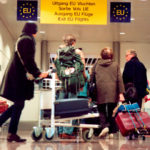 The free movement of people is one of the founding principles of the European Union, and has enabled approximately 10% of EU citizens to live in a country other than their homeland. The Reminder Project aims to provide a web-based tool for this diaspora to share their journey and learn about the journey of others.
The free movement of people is one of the founding principles of the European Union, and has enabled approximately 10% of EU citizens to live in a country other than their homeland. The Reminder Project aims to provide a web-based tool for this diaspora to share their journey and learn about the journey of others.
The platform adopts a ‘choose-your-own-adventure’ format to try and provide an accessible interface to thousands of pages of research. For instance, some people have chosen to move to study abroad, others to work, others simply to enjoy a more interesting life and better weather.
The project also aims to uncover the ways in which migration is dealt with both in the media and in public debates, which is especially important given the combustible nature of such discussions around Europe at the moment.
“It shows that immigration from one EU country to another generates more tax revenue than it costs for governments in most instances, but that aggressive anti-migration narratives in a nation’s media or welfare states that are perceived to lack ‘reciprocity’ can create more negative public attitudes to free movement—both factors that may have contributed to the UK’s departure from the EU,” the team say.
Understanding migration
The project hopes to provide a greater insight into how the various elements of the migration situation in Europe link together. For instance, how media influences politics, which influences the welfare system, which influences the flow of migrants, which influences the economy.
“The REMINDER project has spent three years putting together a comprehensive analysis of these interactions, and our new web-tool allows non-specialists to examine this network of impacts too, and really start to understand how different policy choices shape the migration landscapes of Europe,” the team say.
Migration is so often a topic that is fueled by emotion rather than logic, so having a resource with accurate and robust data on a wide range of migration-related issues across Europe promises to be hugely valuable, both in shaping the public discourse and also the policy landscape.